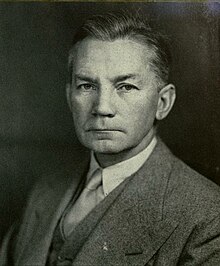James Forrestal
United States Navy officer and civil servant, Undersecretary of the Navy (1892-1949)
James Vincent Forrestal (February 15, 1892 – May 22, 1949) was the last Cabinet-level United States Secretary of the Navy and the first United States Secretary of Defense.



Quotes
edit- King had the brains, all right, but I hated his guts.
- Forrestal told an American senator this after the war. When King heard about it, he replied, "I hated his guts, too." As quoted in American Warlords: How Roosevelt's High Command Led America To Victory In World War II by Johnathan W. Jordan, p. 472
Quotes about Forrestal
edit- Whereas Leahy was stern, reserved, and even dour, King was nothing short of bombastic. Throughout his career, King's personality was routinely commented upon- and frequently feared- by his contemporaries and junior officers alike. His seniors usually found it merely annoying, although many- Forrestal was clearly an exception- tended to overlook his grating manner because there was no question that this demanding and strong-willed individual was also highly intelligent and capable of delivering results. King simply had no tolerance for subordinates who failed to carry out his orders to his satisfaction. Considering King's satisfaction was a very high bar, many failed to clear it. "On the job" wrote historian Robert Love in his history of the chiefs of naval operations, "[King] seemed always to be angry or annoyed." But some of that anger or annoyance may well have been a mask that was best breached when one stood up to him or took the initiative in doing what King likely would have done had he been in the other's shoes.
- Walter R. Borneman, The Admirals (2012), p. 471
- With Forrestal as Navy secretary, King knew retirement would follow quickly. He had gotten along with Knox only because the Chicago newsman knew nothing about the Navy, admitted it, and stayed out of King's way. Forrestal would not. During the war, King had cursed Forrestal out in the halls of the Navy Department, and had browbeaten him into staying out of naval operations. "I didn't like him, and he didn't like me," King said.
- Johnathan W. Jordan, in his book American Warlords: How Roosevelt's High Command Led America To Victory In World War II (2016), p. 472.